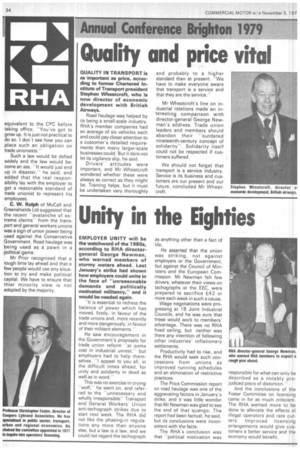Unity in the Eighties
Page 36

If you've noticed an error in this article please click here to report it so we can fix it.
EMPLOYER UNITY will be the watchword of the 1980s, according to RHA directorgeneral George Newman, who warned members of stormy waters ahead. Last January's strike had shown how employers could unite in the face of "unreasonable demands and politically motivated militancy," and it would be needed again.
"It is essential to redress the balance of power which has moved, firstly, in favour of the trade unions and, more recently and more dangerously, in favour of their militant elements.'" He saw encouragement in the Government's proposals for trade union reform "at some cost in industrial unrest," but employers had to help themselves. "I appeal to you all, in the difficult times ahead, for unity and solidarity in deed as well as in word.'" This was no exercise in crying "wolf," he went on, and referred to the "unnecessary and wholly irresponsible"' Transport and General Workers" Union anti-tachograph strikes due to start next week. The RHA did not like the phasing-in regulations any more than anyone else, but a law is a law, and we could not regard the tachograph as anything other than a fact of life.
He asserted that the anion was striking, not against employers or the Government, but against the Council of Ministers and the European Commission. Mr Newman felt few drivers, whatever their views on tachographs or the EEC, were prepared to sacrifice £42 or more each week in such a cause.
Wage negotiations were progressing at 18 Joint Industrial Councils, and he was sure that these would work to members' advantage. There was no RHA fixed ceiling, but neither was there any intention of following other industries' inflationary settlements.
Productivity had to rise, and the RHA would seek such concessions from unions as improved running schedules and an elimination of restrictive practices.
The Price Commission report on road haulage was one of the aggravating factors in January's strike, and it was little wonder that Mr Newman was glad to see the end of that quango. The report.had been factual, he said, but its conclusions were inconsistent with the facts.
The RHA's conclusion was that -political motivation was
responsible for what can only be described as a notably prejudiced piece of distortion.'" And the conclusions of the Foster Committee on licensing came in for as much criticism. The RHA wanted more to be done to alleviate the effects of, illegal operators and rate cutters. Improved licensing arrangements would give customers a better service and the economy would benefit.




























































































































